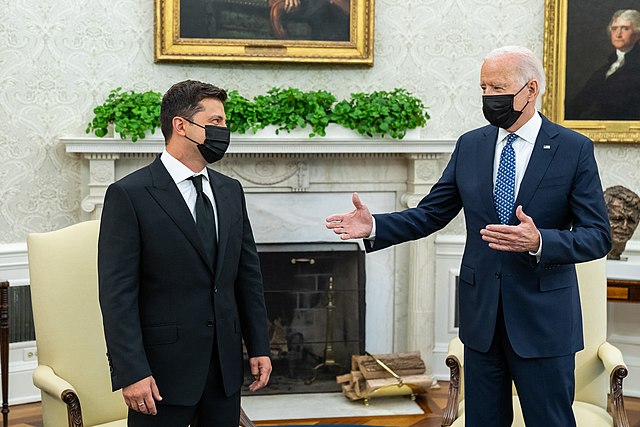WASHINGTON — On Tuesday, Nov. 19, Ukraine marked 1,000 days since Russia launched its full-scale invasion with a military milestone—its first use of the U.S.-manufactured Army Tactical Missile Systems to strike into Russian territory.
The move came days after President Joe Biden’s administration approved Kyiv’s long-sought demand to use American-manufactured weapons to strike deep into Russia.
Shortly after, Russian President Vladimir Putin formalized changes to the country’s nuclear doctrine, lowering the threshold for the use of nuclear weapons and enshrining Russia’s right to respond to “aggression by any non-nuclear state with the participation or support of a nuclear one” in what appears to be a direct reference to the Biden administration’s action.
As tensions escalate and uncertainty looms over the future of the conflict, U.S. and Ukrainian officials face the delicate task of balancing their advocacy for Ukraine with attempts to curry favor with President-elect Donald Trump.
“I look forward to working with President Donald Trump to rebuild the deterrence that the Biden-Harris regime has wandered into endless one-sided war, one with Ukrainian sovereign borders,” Joe Wilson (R.-S.C.), the U.S. Helsinki Commission Chair, said in an opening statement at the commission’s hearing to acknowledge the war’s milestone on Tuesday.
Still, Wilson expressed his support for continuing and accelerating U.S. support of Ukraine, diverging from Trump’s national security approach.
“Unprecedented restrictions that should have never been applied to an ally have led tragically to countless Ukrainian deaths, and have put the world in greater danger than ever before,” Wilson said, adding that “peace through strength is ensuring that Ukraine can strike legitimate military targets within Russia.”
Key Trump allies, such as Rep. Marjorie Taylor Greene (R-Ga.) and the president-elect’s son Donald Trump Jr., have accused President Joe Biden of trying to start World War III by lifting the restriction. Trump himself has not commented on the development, but has criticized the amount the U.S. has spent on supporting Ukraine and pledged to end the war swiftly, repeatedly saying he could end it “in a day.”
Steve Cohen, (D-Tenn.) a member of the Helsinki Commission, noted that Wilson’s outspoken support for Ukraine might hurt his political future under the president-elect’s government.
“At this time, he’s seeking a higher position on the Foreign Affairs Committee, which I hope he gets, but some of his support for Ukraine may be used against him because of the change of administrations,” Cohen said.
“I don’t have much hope for the continued American support which Ukraine needs, but they’ll have mine, and I think they’ll have most of the Democrats, and hopefully they’ll have Republicans like Joe Wilson too,” Cohen added.
Ukraine and Trump
Ukrainian officials speaking at the hearing also appeared preoccupied with getting in Trump’s good grace.
“We cannot call a pause in the war ‘peace.’ We cannot say that justice has been solved while Russian war criminals are still smiling,” Ukraine’s President Volodymyr Zelenskyy said in a message pre-recorded specifically for the hearing.
The statement appears to be a criticism of the mounting pressure to pursue peace talks with Moscow. Among the main advocates for the negotiations is Trump’s incoming administration: Vice-President JD Vance outlined a plan that critics call an equivalent to a Russian victory, with Moscow retaining de facto control over the Ukrainian territory it occupies now and Ukraine left with no membership to the North Atlantic Treaty Organization, or NATO, which it has sought after.
“This war must end in accordance with international law, with peace built through strength, so that Russian forces can never again shatter peace anywhere, anywhere in the world,” Zelenskyy added, paying tribute to Trump’s own pledge. The president-elect has promised “peace through strength” in announcements of several key nominees, and Secretary of State-designate Marco Rubio (R-Fla.) also used the phrase.
This statement is the latest in a series of Zelenskyy’s apparent attempts to win favor with Trump. He told Ukrainian broadcaster Suspilne on Friday, Nov. 15, that Trump’s reelection as president means the conflict will “end faster,” playing to Trump’s “dealmaker” reputation. The Ukrainian leader was also among the first to congratulate the president-elect on his victory, saying he appreciates “President Trump’s commitment to the ‘peace through strength’ approach in global affairs.”
Foreign Minister of Ukraine Andrii Sybiha also attempted to strike a balance between opposing Trump’s alleged plans to strike a deal with Russia and building rapport with the president-elect.
“When facing such a brutal and lawless regime as Putin’s Russia, there can be no alternative to peace through strength,” Sybiha said in testimony at the hearing, honoring Trump’s national security approach.
“Ukraine will not accept any initiative that suggests compromises on our sovereignty or territorial integrity,” he added. “Rewarding Russia with territorial gains will not restore peace, but instead provoke further aggression.”

